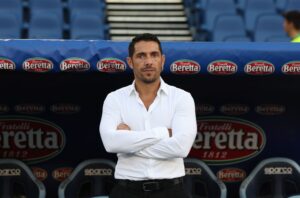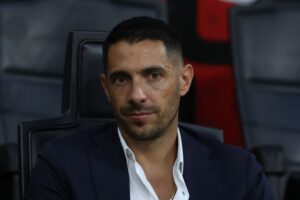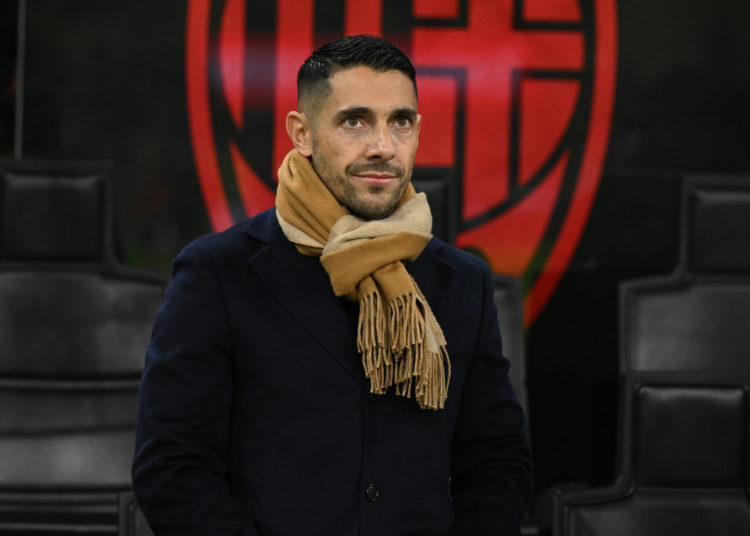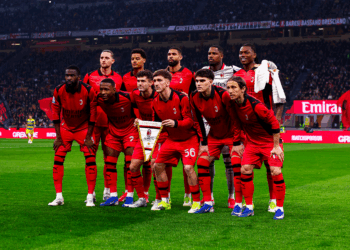Geoffrey Moncada, who arrived at Milan in 2019 from Monaco as Head Scout, has held the role of Technical Director of the club since the summer of 2023, working closely with CEO Giorgio Furlani, RedBird Senior Advisor Zlatan Ibrahimovic, and the First Team coach.
The French executive gave an interview to MilanNews.it, where he discussed his role among several other topics.
What is your typical day at Milanello like?
"I immediately have a meeting with my team, both about the day's program and the week's program. We talk with Zlatan, with Kirovski about all the things we have to do. Also with the team manager. We talk about the games we've seen and a lot more. We have a young group, who need to be followed. It's important to talk to them not only about football, but also about the things that happen to them or that they need off the pitch. To help them. Milanello is the home of our sporting side, where Milan Futuro is also located."
Also to understand the mood a little and establish a human relationship…
“Yes, we do. It’s a young group that needs closeness, to talk. Also about other things, not just football. We try to do this with the coach and with Zlatan, also with all the managers: we have created a working group also for the families. It’s important. We work together every day, we have a good team, we are young, we are hungry, we want to do more and there are many things still to do”.
Looking at the identity card, Milan has a very young management group: you are 37 years old, Zlatan 43, Furlani 45. Do you feel like you are a breath of fresh air in a system where many managers are well over 50-55 years old?
“There is a good mix. There are people like me who come from the world of scouting and relationships with players, there is a finance man like Giorgio who is a real crack when it comes to the economic part and then there is Zlatan who has the point of view of a former great footballer. I think that only by working together can we do things well, a single person, alone, cannot do it. All the top clubs, in Europe, work like this”.

What is the relationship with Zlatan Ibrahimovic? Moncada replied:
“We talk every day. We meet at Casa Milan, at Milanello, we go to eat together. We have a good relationship, very direct. He wants to know things without wasting time, I like that. We are together every day”.
Do you also discuss which players to buy?
“Yes, he likes it too. Now I have opened a profile for him on a professional platform for data analysis and video, so he can see the players too”.
But to get Alvaro Morata, who brought you so much to the leadership level, you didn't need any algorithm.
“This is the perfect example of “non-algorithm”. We took the captain of the Spanish national team, who has won everything and who has also played in Italy. I was totally convinced of Alvaro, I was sure he was the perfect guy for us. He has an important mentality in the dressing room, as a leader”.
Did you make the first call to the player?
“No. First I spoke to the agent, there is also this work to do (laughs, ed.). Zlatan then spoke to the player because he knew him, and then we spoke together. I like this example because it doesn't come from the data. Last year he scored 22 goals last year at Atletico Madrid. For us he is still a very very interesting player. I'm happy, he feels very good here”.
Where are we at with the renewals of Theo Hernandez and Maignan?
“We started the discussions two months ago. I can say that we are in a good position. I don’t know who will be the first but we have started very well. Everyone is really happy, I haven’t seen anyone who wants to leave. You can ask them, everyone is happy here at Milan”.
As Reijnders confirmed in recent days…
“I repeat: we are and they are happy at Milan. We are working. We must try to close the things that we have open”.
And the renewals are also the result of how much you make the boy feel good…
“Exactly, it's not just the part on the pitch. We have to put them in the best possible conditions to be able to do well, but also build a direct relationship with us. They have no problems with me and Zlatan. It's true, we are young in terms of age, but they can talk to us directly and quickly. We can discuss and we are here to help the team”.
Today you are technical director, but you started out as a scout. How much of that role is still inside you and in this Milan? Moncada said:
“When I was a scout, I was out watching games almost every weekend. In Italy or abroad. Now I can't be away all that time because I have other responsibilities and, for example, if we play on Saturday, I travel on Sunday to watch a game. I want to see the players in detail, so I try to move in silence. To avoid creating pressure on the boy that I want to see live to be able to evaluate many things”.
When Milan needs a player, what are the steps?
“First of all, we start by analyzing our team and the areas to develop and improve. We don't just use the algorithm as has been said for a long time. That's not true. We have a database that helps you see players from other countries. You can be the greatest scout in the world, but you can't see all the leagues. The data helps you identify profiles and give you input on certain players, young or not, and can tell you that there are profiles that fit your search in other leagues too”.
When we talk about the Milan market we talk about data, we talk about algorithms, we talk about moneyball. Do you rely entirely on these tools or do you also work a lot on the field?
"The data tells you if there's an interesting player to watch. And we watch him first on video, with all the scouts watching him, and then maybe we go and see him live. But before we go and see him on the field we have to know the player."
How many people on your team work on this thing? Moncada said:
“I have ten scouts at my disposal, five of whom are in Italy and five who are abroad.”
Do they bring you a ready-made “package” on the player or do they specialize in pointing out a profile to you that you will then go and look at?
“It’s a mix of many things. We have a working methodology on the video part, they have a specific area to view. First they watch the player on video all week, then at the weekend they go and see him live to confirm or deny their impressions”.
Are you going to see it live from there too?
“Yes, I’ll try.”
Before you buy a footballer you have to see him live, right?
“Yes. It’s impossible to close a player without seeing him live first. I have a lot of faith in my scouts, we have to have that to work together. Maybe I really like a player, but maybe nine scouts tell me no, that he’s not good. It’s important to all agree together. Seeing them live is important, you see so many things… On video you discover so many things, but fundamental aspects like speed, impact in duels… Those are not judged on video”.
Do you also consider how they train? Moncada commented:
“Yes. For example, years ago I went to Strasbourg to see Youssouf Fofana live, because training was open. Today, however, it is very difficult to enter a sports center. It is good to watch training, but it also depends on what type of training you go to see. If we go after a match (with the team only doing a recovery, ed.) it does not help you”.
And what was it that you noticed about Youssouf Fofana that struck you?
“I saw a young man who had a lot of confidence, who worked hard in training. Then his relationship with the fans was also interesting, he is a boy who is always smiling and open. I liked him, it was his first year in Strasbourg in Ligue 1: immediately a starter, he hasn't had a path in the youth sector before. It was interesting to see how he trains”.
So when did Fofana's name first appear in your databases?
“I arrived in Milan in January 2019, I had already seen Fofana when I was at Monaco, he played in the second team of Strasbourg. I brought my database to Milan and we followed him. He started playing many games in Ligue 1: there it started to be difficult because German and English clubs also arrived. However, we followed him up to Monaco”.
So there's a lot in your database? I guess it's untouchable...
“(Laughs) There are relationships and information from many years ago, it helps you see the growth of a player. We must always be humble when we watch a player: maybe we don’t like him now, but after two or three years he finally strikes us. I really like changing my mind, this is important”.
Moncada, Did Rafael Leao enter your database already from the Sporting youth team?
“Yes, I remember seeing him against Belenenses with Lisbon. I think he was 17. He played as a number 10, as a second striker. He was very free, I saw a very interesting profile: tall, slender, technically super. He scored with incredible confidence. He was one to follow. Then obviously many other scouts saw him, I'm certainly not the first to have seen him. But you know, you go to see an U17 game in Portugal and you see a boy like that… You follow him immediately”.
And then in 2019 he arrived at Milan? Did you report it? Can you explain how it happened?
“We made a shortlist, we needed to get a new left-back. There were some good names (laughs, ed.). There was Leao, there was Malen, there was Marcus Thuram who was at Guingamp… There was this type of profile, physical. Today Leao, Malen and Thuram play at a high level and are doing well. But four or five years ago it wasn't so obvious. Leao was playing at Lille and had only been a starter for six months and we brought him to Milan. It's not easy… In general you are always very hard on players but for me you always have to give them a bit of time”.
The AZ Director said that Tijjani Reijnders is a strong player, everyone slept on him except Milan. How did you get there?
“There are aspects, sometimes, that instill doubt in you. Reijnders took a long time to reach the top levels. He didn't play straight away at AZ: he was in the second team and went on loan. And then you wonder why he didn't play at AZ, which normally puts good players on the pitch straight away? That was our doubt. But it was obviously in our database: we created videos, we analysed the data, there were many reports where we always saw him doing well. He didn't do badly and he didn't do top-top things. He always did well. But the last time he played at AZ he played in the Conference League: I saw him against Lazio, I also went to see him against West Ham... And there I said to myself that this player can do everything, he runs a lot, he's technically good. He's always positive, he always goes forward. I liked his profile, I thought we could bring him to Milan and then see how he would develop. In June we had a meeting with Stefano Pioli, at his home in Parma. He told me straight away that he needed a quality midfielder, a playmaking number 8, a versatile profile. So I showed him Reijnders, Stefano told me straight away that he liked him. From there we moved forward quickly in the negotiations”.
And this year he's also finding the goal... Moncada answered:
“I think he can easily get to 10 goals. But he can also make assists, which are just as important. Everyone talks about goals, true, but finding the final pass is also important.”
And so we come back to the data again… How much do they help you analyze the performance of individuals and the team?
“With the coach we look at the phases of the team and use data: how we press, what type of pressing we do, Expected Goals (data that measures the probability of a shot becoming a goal), Expected Assists (data that measures the probability of a pass becoming an assist, ed.), all the chances we create to get to score, why we haven't scored... There's a mix of video and data. We do this type of work every week to understand what's going well and what's not going well”.
Does this type of work also help you understand which player makes sense to stay at Milan to continue a journey and who instead perhaps can't give anything else?
“I’ll give you an example. Over a period of two months you might think that a guy has done badly, but you still want to check the data. So you see that maybe he didn’t do well but he still created a lot of things. This helps you because you understand that at least he does something. There are players who, even from the data, do nothing, zero. They don’t try dribbling, shooting, duels. So the data helps you, yes. But the thing that is impossible to see with the data is the margin of growth of a player. How he is going to develop after two or three years, this is difficult to predict. It’s an unknown, that’s why the coach, the staff, the scouts who watch the players live are important. By watching him live, maybe you understand that he can improve, he can put on a little more muscle, he can work on his weak foot. There are many things that the data can’t help you with.”
In all this there is Paulo Fonseca. How did you get to him?
“Paulo has a style of play, we saw it at Lille, that I think Milan should have. We play in Milan and at San Siro, we have to control the game and the ball. We have to be solid on these points. Paulo has a good ability to work, he does interesting training sessions. He works individually and with the team. For example, he can work with all the midfielders: after training he takes four or five midfielders and does specific work with them. It's November, at the end of the season I'm sure we'll see many players who will have made a huge step with him”.
This step is to consolidate Milan at the top, right? Moncada replied:
“The top 5 in Europe are City, Liverpool, Bayern, etc. We want to try to get at least close, but it’s not easy. Even Liverpool took eight years to get to this level, it wasn’t like that before. They’ve done an important job. However, they had a strategy with a coach who has a precise playing methodology. We want to do this type of playing methodology with a coach who has clear ideas and develop the players.”
So Fonseca's choices, for example the management of Rafael Leao, are always supported by the management?
“Yes, we work together every day. And now I think Leao is totally different. Just look at his performances in Madrid, Cagliari and with the national team. These are situations that can happen, you are not always perfect otherwise it would be too easy. You have to accept that players can have moments of difficulty and support them as Zlatan and I did with Rafa, giving him support and a constructive discussion. We are a family”.
Can Theo Hernandez become even more of a leader and driving force?
“He will be. He doesn’t even know the potential he can have. A left back like that. I think he will have a great career ahead of him, he is still young”.
Did you also have Theo Hernandez in the database? Moncada answered:
“I had him since he was playing for Atletico Madrid in the Youth League, I saw him when I was at Monaco. But then Real Madrid took him (smiles). After that we followed him to Alaves and Real Sociedad: he had incredible data. He still has a significant margin. He already scores a lot of goals and assists, it is very difficult to find a left back like him”.

Are you already starting to see what this Milan needs?
“Yes. We have already started talking with the various profiles. With Ibra, with Giorgio Furlani, with the coach, with Gerry Cardinale… We have already talked. More or less we already know the profiles we want, but I think it will be more for June. Let's start with the missing profiles, then we'll make a shortlist”.
Can't you tell which ones are missing? Moncada said:
“No, not yet (laughs). In a little while, yes, but if I talk now in November it will be difficult for us. Maybe in the next weekends I will go away to see these players, I will go with the scouts”.
So now we need to follow you and see where you get credited?
“Maybe I’ll change my name (laughs), it’s easier.”
Youssouf Fofana said that Milan is also there for the Scudetto, but you have to give them some time.
“Yes, I’m sure this team has room for that.”
But already this year?
“Yes. We suffered in the first matches but we saw that in the big matches, against Inter and against Real Madrid, we are present, we saw a really good Milan. We must aim to always see it by putting a little more concentration also in the other matches. It's a mental thing. We do everything to get on this path”.
Pulisic is definitely one of the best signings of the last two years. How did you choose him?
“At Dortmund he was a crazy player, really strong. Chelsea took him for this, he is someone who can play on the right, on the left, as a number ten, behind the striker. In Germany he had impressive data, at Chelsea no. We thought it was impossible for a player like that not to perform at a high level in the Premier League. When we lost Brahim Diaz this name came up immediately, it was a possibility to be had in that market. Timing makes a lot. Maybe two years earlier it would have been impossible. But when there is space to make a player like that you have to take him immediately”.
What role do you see him in? Outside or in the middle?
“Last year as a right winger he had the best season of his life. Today, however, perhaps we need him as an attacking midfielder," answered Moncada.
What is the purchase that gave you the most satisfaction here at Milan? Maybe for the negotiation that was particular…
“Tijji Reijnders. He was a guy who came out later. We followed him for many years in the second team of AZ. I had gone to see the U20 World Cup in Argentina, I had already met his agent in Italy. We had spoken about Reijnders and the negotiation started in Argentina, it didn't start in Holland”.
So is it useful to turn?

“Always in Argentina (laughs). Like Enzo Fernandez (who later went to Benfica, ed.), I was always in Argentina. The negotiations for Reijnders, however, began in Argentina, in May. It wasn’t easy to negotiate with a Dutch club, the club was good," said Moncada.
You told us about scouting and observation, instead, as Technical Director, what responsibilities do you have?
“Since I have taken on this role I have had a more in-depth relationship with the staff and the coach, we do a lot of video analysis. I like to talk to them about tactics, how we play and what we can do. Then there is the “locker room” part with the players, asking them how things are going at home. There is a mix: I am at Milanello in the morning, at Casa Milan, in the office, in the afternoon. I am still young, I still have to do and learn a lot of things. I cannot do just one thing or just the other. It is important to be present here at Milanello, just as it is important to be present in Europe: to see what the other clubs are doing, to meet the new directors, etc. I have to try to know everything in advance to do my job in the best way possible”.
In 2019 you started with a methodology that was little known in Italy, going outside the classic canons. Today many owners who take over Italian clubs are looking at this methodology. Have you gained an advantage over those who will have to adapt?
“What I like is that here now we work with the scout area and the data area together. Before the two departments worked alone. Now we all work together and I like it a lot. Those who work with data have understood that there is a need for the human aspect, we have understood that we need data to see other things”.
How proud were you, as a team, to have managed to retain Rafael Leao at a time when it seemed like something else could happen?
“First of all, we have to thank the club. They did a great job, it wasn't easy. When Rafa wants to do things, and you saw it in Madrid, no one can stop him. And that's why it's always good to have a profile like that: he's Milan's number 10, I'm so happy to have him with us. And it doesn't end there”.
In the process that leads to the selection of a player, is there a minimum number of matches, home and away, that you go to watch?
“At least two home games and two away games. Another very important thing is to have meetings with the player's entourage. Maybe there are ten people close to the player and you have to know it right away. Understand what kind of people they are, how they work. I'm not talking about agents but about family and friends. For this reason we can also travel to meet the players in person, not just to see them in games. It's another important aspect”.
How do you choose a player who can play at San Siro? Moncada replied:
“I like watching games against Premier League teams, there is a monstrous pressure there. Also games of Turkish or Greek clubs: a Dutch club, for example, that goes to play there is very important to see how the player reacts to a certain type of environment. At San Siro it is not easy, yes. But if we are afraid of a stadium it is not good, so our job is also to help them in this aspect."
















